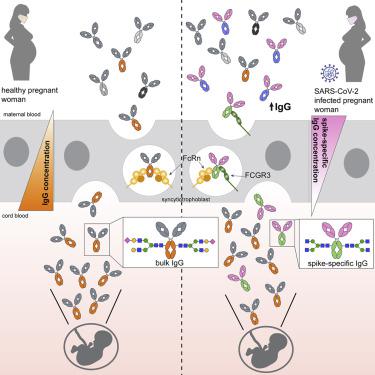Cell ( IF 64.5 ) Pub Date : 2020-12-23 , DOI: 10.1016/j.cell.2020.12.027 Caroline Atyeo 1 , Krista M Pullen 2 , Evan A Bordt 3 , Stephanie Fischinger 4 , John Burke 5 , Ashlin Michell 5 , Matthew D Slein 5 , Carolin Loos 6 , Lydia L Shook 7 , Adeline A Boatin 7 , Laura J Yockey 8 , David Pepin 9 , Marie-Charlotte Meinsohn 9 , Ngoc Minh Phuong Nguyen 9 , Maeva Chauvin 9 , Drucilla Roberts 10 , Ilona T Goldfarb 7 , Juan D Matute 11 , Kaitlyn E James 7 , Lael M Yonker 11 , Lisa M Bebell 12 , Anjali J Kaimal 7 , Kathryn J Gray 13 , Douglas Lauffenburger 2 , Andrea G Edlow 14 , Galit Alter 5

|
SARS-CoV-2 infection causes more severe disease in pregnant women compared to age-matched non-pregnant women. Whether maternal infection causes changes in the transfer of immunity to infants remains unclear. Maternal infections have previously been associated with compromised placental antibody transfer, but the mechanism underlying this compromised transfer is not established. Here, we used systems serology to characterize the Fc profile of influenza-, pertussis-, and SARS-CoV-2-specific antibodies transferred across the placenta. Influenza- and pertussis-specific antibodies were actively transferred. However, SARS-CoV-2-specific antibody transfer was significantly reduced compared to influenza- and pertussis-specific antibodies, and cord titers and functional activity were lower than in maternal plasma. This effect was only observed in third-trimester infection. SARS-CoV-2-specific transfer was linked to altered SARS-CoV-2-antibody glycosylation profiles and was partially rescued by infection-induced increases in IgG and increased FCGR3A placental expression. These results point to unexpected compensatory mechanisms to boost immunity in neonates, providing insights for maternal vaccine design.
中文翻译:

受损的 SARS-CoV-2 特异性胎盘抗体转移
与年龄匹配的非孕妇相比,SARS-CoV-2 感染会导致孕妇患上更严重的疾病。母体感染是否会导致免疫向婴儿转移的变化尚不清楚。母亲感染以前与胎盘抗体转移受损有关,但这种受损转移的潜在机制尚未确定。在这里,我们使用系统血清学来表征跨胎盘转移的流感、百日咳和 SARS-CoV-2 特异性抗体的 Fc 谱。流感和百日咳特异性抗体被积极转移。然而,与流感和百日咳特异性抗体相比,SARS-CoV-2 特异性抗体转移显着减少,脐带滴度和功能活性低于母体血浆。这种效果仅在孕晚期感染中观察到。SARS-CoV-2 特异性转移与 SARS-CoV-2 抗体糖基化谱的改变有关,并且被感染诱导的 IgG 增加和 FCGR3A 胎盘表达增加部分挽救。这些结果指出了增强新生儿免疫力的意外补偿机制,为母体疫苗设计提供了见解。



























 京公网安备 11010802027423号
京公网安备 11010802027423号